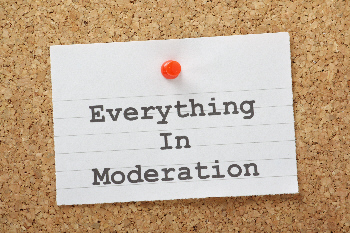Why “Everything In Moderation” Isn’t Good Diet Advice
By David Sciola

What are some of the biggest dogmas that have been perpetuated by conventional health wisdom in recent decades? I can think of two in particular: “everything in moderation” and “eat a balanced diet.”
There is some sense in these statements. Eating a broad range of foods can minimize the occurrence of micronutrient deficiencies, which are rife in a Western diet. Similarly, not overindulging in certain foods can help mitigate the harm of overexposure to certain nasties such as sugar, industrial chemicals or heavy metals.
Yet these ideas are simplistic. There’s no point eating a broad diet if most of what you consume is rubbish – refined carbohydrates, processed meats and alcohol.
Eating seven different types of grains (corn, rice, wheat, barley, rye, sorghum and buckwheat) is not going to improve your health. And drinking seven different types of beer may be fun and delicious, but it’s certainly no better for you that drinking just one type – or better still, none at all.
Furthermore, I would argue that some foods are not OK even in moderation. Things like trans fats, high fructose corn syrup and corn oil are bad for you in any quantity and should be completely avoided.
So you can basically take the “everything in moderation” and “eat a balanced diet” mantras and throw them out the window with your margarine and skim milk.
Now I would like to address another dogma that follows from the incorrect assumption that a broad, balanced diet must include all food groups.
It seems that many dietitians and nutritionists have been brainwashed into thinking that cutting out entire food groups is somehow dangerous or detrimental to health. Let’s take a minute to consider this myth rationally.
No science nor logic exists to support the argument that cutting out entire food groups is unhealthy in and of itself.
“On a nutritional basis, grains are inferior to whole plants and animals in every way. Want fiber? Eat Brussels sprouts. Want magnesium? Eat dark chocolate.”
Humans require essential amino acids (proteins), essential fatty acids (fats) and essential micronutrients

(vitamins and minerals) but there is no such thing as an essential “food group” – or an essential carbohydrate for that matter.
Whatever minimal nutrition you think you are missing out on from avoiding grains and legumes can be found in greater quantities and greater bioavailability in seafood, meat, vegetables, fruits, nuts and seeds.
Nutritionally, grains excel in only two parameters – carbohydrates and calories. Unsurprisingly, these are the two things that are most chronically over-consumed in a Western diet. They also happen to be the main culprit for obesity and diabetes.
When you consider that grains are also cheap, transportable, storable, addictive and hugely profitable you start to understand why they are such an integral part of our current food system, which is effectively an oligopoly of gigantic grain-centric agriculture companies.
What baffles me is that educated health experts still consider grains to be an essential part of a “balanced” diet. On a nutritional basis, grains are inferior to whole plants and animals in every way. Want fiber? Eat Brussels sprouts. Want magnesium? Eat dark chocolate.
What’s more, we’ve only been eating grains in any meaningful way for some 10,000 years or so – a few ticks of the second hand on the evolutionary clock. Before agriculture, humans thrived without grains, legumes or dairy for some 99.5% of our history.
Contemporary hunter-gatherer tribes studied in recent centuries demonstrate again and again very healthy societies, free from metabolic disease, that thrive on diets free from grains and legumes.
Ask any one of the millions of people who have benefited from cutting out entire food groups – animal products for vegans or grains and legumes for Paleo dieters – and they’ll confirm what these dietitians and nutritionists fail to understand … that cutting out entire food groups can be one of the best things you can do for your health.

David Sciola
Hi I’m David Sciola, an Aussie fashion model living in New York City. I’m a self-confessed nutrition junkie with a Paleo bent. Let me share my knowledge and experience with you … “Form a habit. Forge a lifestyle.”
Twitter: @ThePaleoModel
Instagram: @ThePaleoModel
Website: ThePaleoModel.com
Printed with presmission. Copyright (c) 2014 by David Sciola.
